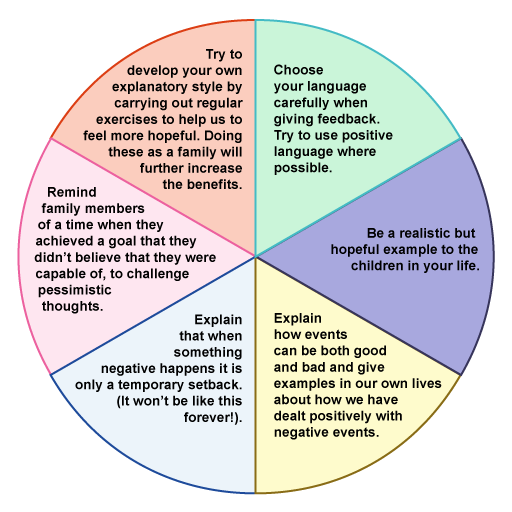6.3 Hope and optimism activities for you and your family
Now that you have developed a clearer understanding of the benefits of developing a more optimistic outlook, we explore some ideas that you can use both on your own and with your family, that have been shown to train your mind to become more hopeful.
It has been suggested by Seligman (2002) that we learn our explanatory styles as children, by the adults that are around us. We tend to imitate the voices that we hear the most, like our parents, caregivers, teachers, etc. As a child, when we hear an optimistic voice, we internalise that message and believe it to be true, and so this makes the child view the world in a more optimistic way.
Likewise, this idea also works the opposite way too. For example, if a teacher tells a child that they are hopeless at reading, the child might grow up believing this and may refuse to read books as an adult, as they feel it would be hopeless to do so.
Assuming the possible effects of praise/criticism, it is important to consider how our explanatory style might affect the people around us in our home and family.
We can do this in the following ways that are demonstrated in the diagram below.
 Activities to foster hope and optimism
Activities to foster hope and optimism
Here are some additional activities that can help to foster hope and optimism in your family.
Spend more time with optimistic and positive people
Think of people around you who tend to look on the bright side of life. Plan to spend more time with them as optimistic attitudes can often be contagious. Connecting with others and focusing on more positive outcomes to problems may help you to avoid more negative ways of thinking.
Gardening
Buy some seeds, sunflower seeds are a good choice, and plant them in pots with your family. Water them and watch them grow. Talk together about how, with patience and care, beautiful things can grow from very little.
Remember happy times
It can be easy to feel, especially for children, that a difficult time will never end. Remind yourself and your family of times when you were resilient and positive, and the outcome was good. Think about how this made you feel at the time and consider whether you will still be worrying about this problem next year. Share hopeful stories with each other.
Look for the silver lining when possible
When dealing with challenging times, it can be helpful to try to gain perspective by looking for any positives in the situation. This can help you to be more rational and use less ‘black and white’ thinking, recognising that there may be something positive to take from the situation
6.2 Realistic hope and optimism



